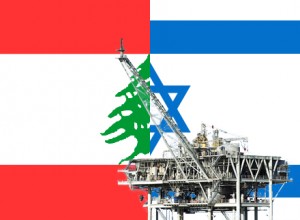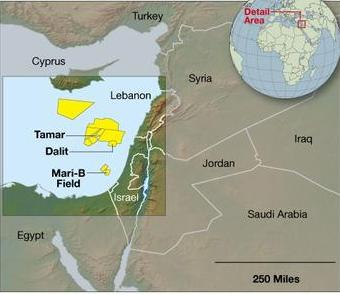 The dispute over vast natural gas fields in the eastern Mediterranean, centered on Israel and Lebanon, has spread to divided Cyprus, which involves longtime rivals Greece and Turkey.
The dispute over vast natural gas fields in the eastern Mediterranean, centered on Israel and Lebanon, has spread to divided Cyprus, which involves longtime rivals Greece and Turkey.
Israel’s discovery of three large fields containing an estimated 25 trillion cubic feet of gas off its northern coast over the last two years has added a whole new energy dimension to the Arab-Israeli conflict.
It has fueled tension between Israel and Lebanon, its northern neighbor, at a time when the Jewish state feels threatened by Iran and its allies, particularly the heavily armed Hezbollah movement in Lebanon.
 The Beirut government claims that the biggest of the fields, Leviathan, containing up to 16 trillion cubic feet of gas as well as 4.3 billion barrels of oil, extends into Lebanese territorial waters and has warned Israel not to encroach on its turf.
The Beirut government claims that the biggest of the fields, Leviathan, containing up to 16 trillion cubic feet of gas as well as 4.3 billion barrels of oil, extends into Lebanese territorial waters and has warned Israel not to encroach on its turf.
The Iranian-backed Hezbollah, which runs its own state within a state and has the most powerful forces in Lebanon, has threatened military action if Israel taps into what it deems Lebanese energy resources.
Israel has vowed to retaliate for any attacks on its gas fields and the energy infrastructure that’s expected to be developed over the next couple of years.
But the stakes have become much higher. A recent U.S. Geological Survey reported that there’s up to 122 trillion cubic feet of recoverable gas off the coasts of Syria, Lebanon, Israel and the Gaza Strip.
Further south, Egypt is already producing gas and selling it to Israel.
On top of all that, the fields extend westward from the Levantine coastline toward Cyprus — right into another conflict, albeit confined to the diplomatic arena these days, between Greece and Turkey.
Cyprus was dominated by Greek Cypriots until 1974, when Turkey invaded following an Athens-engineered coup aimed at uniting the island with Greece.
Turkey captured the northern one-third of the island. It maintains 40,000 troops in the self-declared Turkish Republic of Northern Cyprus.
Only Ankara recognizes the TRNC. The Greek Cypriot government in Nicosia is recognized internationally.
On Dec. 17, Cyprus, which has been exploring for offshore oil and gas fields for some time, and Israel signed an agreement in Nicosia dividing the 155 miles of water that separates them down the middle.
That defined the maritime border between the island and Israel and delineated their exclusive economic zones, or EEZs, allowing them to move ahead with further exploration in the eastern Mediterranean.
Three days later, the Turkish Foreign Ministry tongue-lashed the Israeli ambassador to Ankara, Gaby Levy, and warned, somewhat spuriously, that the agreement undermined efforts to reunify the divided island.
The spat deepened a rift between Israel and Turkey. They were once strategic allies but the relationship nosedived when Israeli commandos killed nine Turks aboard a ship carrying humanitarian aid to Gaza, blockaded by the Israelis, in international waters May 31.
Ankara fears the Greek Cypriots, the majority on the divided island, won’t share any wealth they may accrue from offshore gas fields in their 20,400-square-mile EEZ with the Turks in the TRNC.
The Greek Cypriot government launched its first licensing round in mid-2007, covering a 7,720-square-mile area.
Among the companies were Nobel Energy of Houston and its Israeli partner, Delek Drilling, the outfits that struck it rich off Israel.
Turkey strenuously opposed that and sought to dissuade oil companies from conducting exploration.
Ankara also was planning to start oil and gas exploration in waters between the southeastern Turkish city of Mersin and the northern coast of the TRNC.
That raised the possibility of yet another dispute over eastern Mediterranean gas fields.
In 2008, Nicosia protested to the United Nations and the European Union about what it termed Turkish harassment of survey ships in the Cyprus EEZ.
And there’s another wrinkle. Greece has sovereignty over islands close to the Turkish coast. If they all declare maritime EEZs, Turkey will feel even more cut out of the energy bonanza that seems to be emerging on their doorstep.
The Greek Cypriots signed an exclusive-zone agreement with Lebanon to demarcate maritime borders in 2007 that will determine who can drill where.
Nicosia has signed similar pacts with Syria, which has yet to initiate offshore exploration, and Egypt. UPI

Leave a Reply
You must be logged in to post a comment.